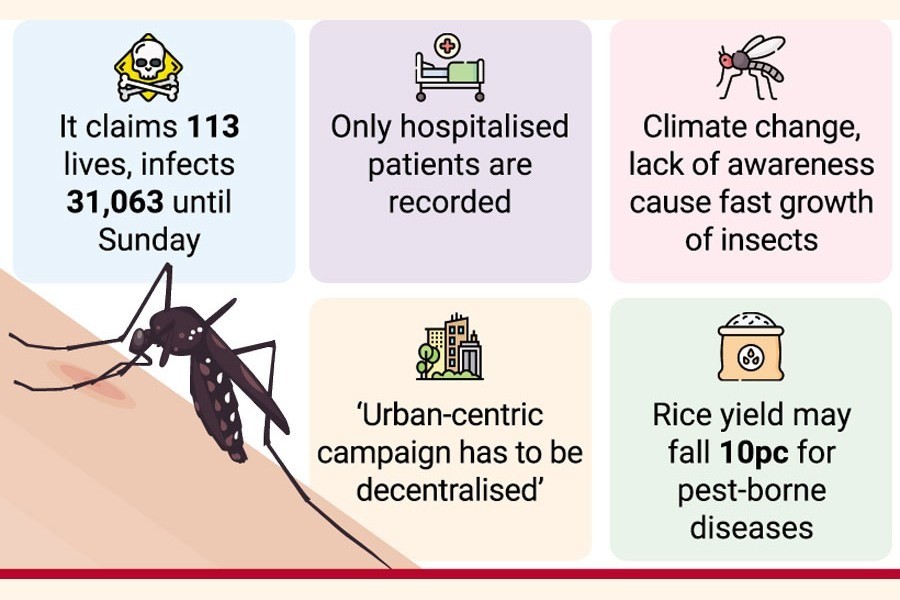Nargis Banu's efforts to control Aedes mosquitoes in her residence proved futile as her six-year son was infected by dengue on Monday.
Ms Banu, the mid-age lady - residing in the city's Mirpur Arambag area, was in search of O+ blood following instruction of doctors, as the platelet level of her son was going down alarmingly.
Ms Banu, a panicked mother sitting on a corridor of the Bangabandhu Sheikh Mujib Medical University (BSMMU), said "Aedes mosquito may be present all over the country. I wonder how my son got infected despite taking all types of precautions at home."
"How did the small species become so dangerous over the years?" she questioned.
Her question is now in the minds of thousands of people, who are directly or indirectly experiencing the impact of this deadly mosquito-borne disease.
Until Sunday, dengue has claimed 113 lives and infected 31,063 people across the country. Dengue claimed 105 lives in 2021, seven in 2020, and 179 in 2019.
Entomologists, health experts and scientists said apart from lack of awareness, climate change is mostly responsible for fast growth of such harmful insects.
Not only mosquitoes, growth of flies and other harmful pests in agricultural fields has also triggered, as the planet is getting warmer, they added.
Dr Mohammad Shafiul Alam, a scientist of the International Centre for Diarrhoeal Disease Research, Bangladesh's (icddr,b) Infectious Diseases Division, said the spread of dengue has turned into an endemic in the country, and climate factor is mainly responsible for surge of Aedes.
Change in rainfall cycles expedites breeding of such species, which are now infecting people from urban to rural areas, even in the hilly district of Bandarban too.
Dengue will spread more across the country in the coming days. So, the present urban-centric awareness campaign has to be decentralised, he opined.
Dr Alam further said due to lack of proper surveillance system the actual data of dengue-infected patients is not available. Only numbers of hospitalised dengue patients are recorded, as the patients who stay in home are not counted.
Besides, malaria, another mosquito-borne disease, also increased in the country too and it has crossed last year's case numbers, he added.
Dr Mohammed Sakhawat Hossain, Professor of Entomology, Sher-e-Bangla Agricultural University said, "Climate change triggers growth of harmful insects and decline of useful ones."
A recent report of the World Economic Forum (WEF) said increase in temperature raises physiological activities and metabolic rates of insects. Insects must eat more to survive, and it is likely that these will grow faster.
"This will lead to an increase in the population growth rate of certain insects," it added.
A study of the World Bank (WB) said Bangladesh has experienced a 0.5° Celsius increase in average temperature between 1976 and 2019.
The country is gradually losing variations between the seasons. Its summers are becoming hotter and longer, winters are getting warmer, and monsoon seasons are extending from February to October.
According to the WB prediction, average temperature across Bangladesh will rise by 1.4° Celsius by 2050, and annual rainfall is likely to increase by 74 millimetres by 2040-2059.
The WB said the threats of climate change in Bangladesh have already affected the health of its population in the form of higher incidences of different diseases, including dengue.
Dr Hossain said some species are getting extinct due to climate change, while some species of insects are growing fast. As volume of carbon dioxide is increasing in the air and oxygen is declining, some of the insects are turning smaller than their usual size.
He blamed mismanagement in urban life, presence of stagnant water, poor waste management system, and consumption of packaged food for fast breeding of flies.
The entomologist also said growth of such insects could be minimised through creating awareness and maintaining household cleanliness.
Meanwhile, the city dwellers are now experiencing annoying presence of flies also, even in high-rise buildings.
Rowshon Akter, a resident of the city's Mogbazar area, said they have become irritated with the influx of flies in their apartment in recent times. The flies are all-time guests in the house; no matter it is breakfast, lunch or dinner time.
She wonders how those flies grow up in the fifteen-storied building despite maintaining all hygiene-related steps.
Malik Fida A Khan, Executive Director of Centre for Environment and Geographic Information Services (CEGIS), said growth of such insects might be an impact of global warming, although there is no study yet (in the country). Insects' growth rate rises with the increase in the planet's heat.
"Bangladesh is a vulnerable country for climate change. Considering this, the government has drafted a 27-year National Adaptation Plan (NAP) to tackle this situation," he added.
Dr Abdul Latif, Chief Scientific Officer and Divisional Head, Plant Pathology Division of the Bangladesh Rice Research Institute (BRRI), said yield of rice may decrease up to 10 per cent due to various pest-borne diseases in the field.
It is evident that vector-borne diseases are rising with the increase in the earth's temperature. Some of the diseases of rice will aggravate further due to the impact of climate change.
A study is underway to assess or quantify the loss of rice production due to climate change, he noted.
Researchers said extensive studies have to be carried out to find out detailed growth of such insect-borne diseases due to the impact of climate change.


